요한 18,1―19,42 파스카 성삼일 – 주님 수난 성금요일
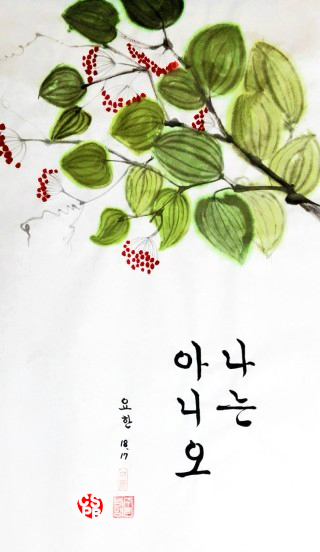
“나야 유다인이 아니잖소?
당신의 동족과 수석 사제들이
당신을 나에게 넘긴 것이오.
당신은 무슨 일을 저질렀소?”
빌라도는 의인일까
아니면 방관자일까?
빌라도는 예수님 편일까
아니면 바리사이들의 편일까?
빌라도의 이도저도 아닌것 같은 그 태도는
여러가지 질문을 하게 한다.
너의 생각이냐는 예수님의 질문에 답한
빌라도의 저 한마디는 여러가지를 생각하게 한다.
빌라도에게서 우리들의 모습을 보기도 한다.
아무것도 책임지고 싶지 않은 모습.
책임을, 또는 결정을 타인에게 넘겨
손해보고 싶어하지 않는 모습.
예수님을 대할 때,
이웃을 대할 때
우리 또한 그러한 태도를 취한다.
나는 유다인이 아니라고,
당신을 죄인취급한건
내가 아니라 다른사람이니
나는 아무런 상관이 없다고.
이런 일이 일어나는 이유는
당신에게 있지 않냐며
모든 것에서 회피하는 그 모습이 낯설지 않다.
우리는 쉽게 방관자가 된다.
십자가에 못박으라며 소리를 지르지도
그렇다고 그분은 죄인이 아니라며
따르지도 않는 방관자
십자가의 길을 따라 걸으면서도
나와는 상관없다며
그 집행엔 나의 지분이 없다 여기는 방관자
온갖 조롱속에서 핍박받는 예수님을 보며
‘그래도 나는 저렇게 까지는 하지 않았어’라며
책임을 회피하는 방관자 등
이도 저도 아님 속에서
죄인은 아니라는 안도감 안에
우리도 모르게 예수님께
간접적인 사형선고를 내리고 있다.
지금 나는 저 상황속에서
어떤 역할을 하고 있는가 바라 보아야한다.
십자가에 못 박으라며 소리를 지르는지,
거짓 증거를 내세우며 예수님을 고소하고 있는지,
아니면 눈물을 흘리며 그 길을 함께 걸어가며
십자가 아래서 예수님을 바라보고 있는지
아니면 방관자로서
아무런 곳에도 속하지 않고 있는지……
– 김 바니아 수녀 –
○ 요한이 전한 우리 주 예수 그리스도의 수난기입니다.18,1―19,42
○ 그때에 1 예수님께서는 제자들과 함께 키드론 골짜기 건너편으로 가셨다.
거기에 정원이 하나 있었는데 제자들과 함께 그곳에 들어가셨다.
2 예수님께서 제자들과 함께 여러 번 거기에 모이셨기 때문에,
그분을 팔아넘길 유다도 그곳을 알고 있었다.
3 그래서 유다는 군대와 함께, 수석 사제들과 바리사이들이 보낸
성전 경비병들을 데리고 그리로 갔다.
그들은 등불과 횃불과 무기를 들고 있었다.
4 예수님께서는 당신께 닥쳐오는 모든 일을 아시고
앞으로 나서시며 그들에게 물으셨다.
+ “누구를 찾느냐?”
5 ○ 그들이 대답하였다.
▣ “나자렛 사람 예수요.”
○ 예수님께서 말씀하셨다.
+ “나다.”
○ 예수님을 팔아넘길 유다도 그들과 함께 서 있었다.
6 예수님께서 “나다.” 하실 때, 그들은 뒷걸음치다가 땅에 넘어졌다.
7 예수님께서 다시 물으셨다.
+ “누구를 찾느냐?”
○ 그들이 대답하였다.
▣ “나자렛 사람 예수요.”
8 ○ 예수님께서 말씀하셨다.
+ “‘나다.’ 하지 않았느냐?
너희가 나를 찾는다면 이 사람들은 가게 내버려 두어라.”
9 ○ 이는 “아버지께서 저에게 주신 사람들 가운데 하나도 잃지 않았습니다.” 하고
당신께서 전에 하신 말씀이 이루어지게 하려는 것이었다.
10 그때에 시몬 베드로가 가지고 있던 칼을 뽑아,
대사제의 종을 내리쳐 오른쪽 귀를 잘라 버렸다. 그 종의 이름은 말코스였다.
11 그러자 예수님께서 베드로에게 이르셨다.
+ “그 칼을 칼집에 꽂아라.
아버지께서 나에게 주신 이 잔을 내가 마셔야 하지 않겠느냐?”
12 ○ 군대와 그 대장과 유다인들의 성전 경비병들은 예수님을 붙잡아 결박하고,
13 먼저 한나스에게 데려갔다. 한나스는 그해의 대사제 카야파의 장인이었다.
14 카야파는 백성을 위하여 한 사람이 죽는 것이 낫다고 유다인들에게 충고한 자다.
15 시몬 베드로와 또 다른 제자 하나가 예수님을 따라갔다.
그 제자는 대사제와 아는 사이여서,
예수님과 함께 대사제의 저택 안뜰에 들어갔다.
16 베드로는 대문 밖에 서 있었는데,
대사제와 아는 사이인 그 다른 제자가 나와서 문지기 하녀에게 말하여
베드로를 데리고 들어갔다. 17 그때에 그 문지기 하녀가 물었다.
● “당신도 저 사람의 제자 가운데 하나가 아닌가요?”
○ 그러자 베드로가 말하였다.
● “나는 아니오.”
18 ○ 날이 추워 종들과 성전 경비병들이 숯불을 피워 놓고 서서 불을 쬐고 있었는데,
베드로도 그들과 함께 서서 불을 쬐었다.
19 대사제는 예수님께 그분의 제자들과 가르침에 관하여 물었다.
20 예수님께서 그에게 대답하셨다.
+ “나는 세상 사람들에게 드러내 놓고 이야기하였다.
나는 언제나 모든 유다인이 모이는 회당과 성전에서 가르쳤다.
은밀히 이야기한 것은 하나도 없다.
21 그런데 왜 나에게 묻느냐? 내가 무슨 말을 하였는지
들은 이들에게 물어보아라. 내가 말한 것을 그들이 알고 있다.”
22 ○ 예수님께서 이렇게 말씀하시자,
곁에 서 있던 성전 경비병 하나가 예수님의 뺨을 치며 말하였다.
● “대사제께 그따위로 대답하느냐?”
23 ○ 예수님께서 대답하셨다.
+ “내가 잘못 이야기하였다면 그 잘못의 증거를 대 보아라.
그러나 내가 옳게 이야기하였다면 왜 나를 치느냐?”
24 ○ 한나스는 예수님을 결박한 채로 카야파 대사제에게 보냈다.
25 시몬 베드로는 서서 불을 쬐고 있었다. 사람들이 그에게 물었다.
▣ “당신도 저 사람의 제자 가운데 하나가 아니오?”
○ 베드로는 부인하였다.
● “나는 아니오.”
26 ○ 대사제의 종 가운데 하나로서, 베드로가 귀를 잘라 버린 자의 친척이 말하였다.
● “당신이 정원에서 저 사람과 함께 있는 것을 내가 보지 않았소?”
27 ○ 베드로가 다시 아니라고 부인하자 곧 닭이 울었다.
28 사람들이 예수님을 카야파의 저택에서 총독 관저로 끌고 갔다.
때는 이른 아침이었다.
그들은 몸이 더러워져서 파스카 음식을 먹지 못할까 두려워,
총독 관저 안으로 들어가지 않았다.
29 그래서 빌라도가 그들이 있는 곳으로 나와 물었다.
● “무슨 일로 저 사람을 고소하는 것이오?”
30 ○ 그들이 빌라도에게 대답하였다.
▣ “저자가 범죄자가 아니라면 우리가 총독께 넘기지 않았을 것이오.”
31 ○ 빌라도가 그들에게 말하였다.
● “여러분이 데리고 가서 여러분의 법대로 재판하시오.”
○ 그러자 유다인들이 말하였다.
▣ “우리는 누구를 죽일 권한이 없소.”
32 ○ 이는 예수님께서 당신이 어떻게 죽임을 당할 것인지 가리키며
하신 말씀이 이루어지려고 그리된 것이다.
33 그리하여 빌라도가 다시 총독 관저 안으로 들어가 예수님을 불러 물었다.
● “당신이 유다인들의 임금이오?”
34 ○ 예수님께서 되물으셨다.
+ “그것은 네 생각으로 하는 말이냐?
아니면 다른 사람들이 나에 관하여 너에게 말해 준 것이냐?”
○ 빌라도가 다시 물었다.
35 ● “나야 유다인이 아니잖소? 당신의 동족과 수석 사제들이
당신을 나에게 넘긴 것이오. 당신은 무슨 일을 저질렀소?”
36 ○ 예수님께서 대답하셨다.
+ “내 나라는 이 세상에 속하지 않는다. 내 나라가 이 세상에 속한다면,
내 신하들이 싸워 내가 유다인들에게 넘어가지 않게 하였을 것이다.
그러나 내 나라는 여기에 속하지 않는다.”
37 ○ 빌라도가 물었다.
● “아무튼 당신이 임금이라는 말 아니오?”
○ 예수님께서 대답하셨다.
+ “내가 임금이라고 네가 말하고 있다.
나는 진리를 증언하려고 태어났으며, 진리를 증언하려고 세상에 왔다.
진리에 속한 사람은 누구나 내 목소리를 듣는다.”
38 ○ 빌라도가 예수님께 말하였다.
● “진리가 무엇이오?”
○ 빌라도는 이 말을 하고 다시 유다인들이 있는 곳으로 나가 그들에게 말하였다.
● “나는 저 사람에게서 아무런 죄목도 찾지 못하겠소.
39 그런데 여러분에게는 내가 파스카 축제 때에
죄수 하나를 풀어 주는 관습이 있소.
내가 유다인들의 임금을 풀어 주기를 원하오?”
40 ○ 그러자 유다인들이 다시 외쳤다.
◎ “그 사람이 아니라 바라빠를 풀어 주시오.”
○ 바라빠는 강도였다.
19,1 그리하여 빌라도는 예수님을 데려다가 군사들에게 채찍질을 하게 하였다.
2 군사들은 또 가시나무로 관을 엮어 예수님 머리에 씌우고
자주색 옷을 입히고 나서, 3 그분께 다가가 이렇게 말하며 그분의 뺨을 쳐 댔다.
▣ “유다인들의 임금님, 만세!”
4 ○ 빌라도가 다시 나와 말하였다.
● “보시오, 내가 저 사람을 여러분 앞으로 데리고 나오겠소.
내가 저 사람에게서 아무런 죄목도 찾지 못하였다는 것을
여러분도 알라는 것이오.”
5 ○ 이윽고 예수님께서 가시나무 관을 쓰시고 자주색 옷을 입으신 채
밖으로 나오셨다. 그러자 빌라도가 그들에게 말하였다.
● “자, 이 사람이오.”
6 ○ 그때에 수석 사제들과 성전 경비병들은 예수님을 보고 외쳤다.
▣ “십자가에 못 박으시오! 십자가에 못 박으시오!”
○ 빌라도가 말하였다.
● “여러분이 데려다가 십자가에 못 박으시오.
나는 이 사람에게서 죄목을 찾지 못하겠소.”
7 ○ 그러자 유다인들이 빌라도에게 대답하였다.
◎ “우리에게는 율법이 있소. 이 율법에 따르면 그자는 죽어 마땅하오.
자기가 하느님의 아들이라고 자처하였기 때문이오.”
8 ○ 빌라도는 이 말을 듣고 더욱 두려운 생각이 들었다.
9 그리하여 다시 총독 관저로 들어가 예수님께 물었다.
● “당신은 어디서 왔소?”
○ 예수님께서는 아무 대답도 하지 않으셨다.
10 그러자 빌라도가 예수님께 말하였다.
● “나에게 말을 하지 않을 작정이오? 나는 당신을 풀어 줄 권한도 있고
당신을 십자가에 못 박을 권한도 있다는 것을 모르시오?”
11 ○ 예수님께서 대답하셨다.
+ “네가 위로부터 받지 않았으면 나에 대해 아무런 권한도 없었을 것이다.
그러므로 나를 너에게 넘긴 자의 죄가 더 크다.”
12 ○ 그때부터 빌라도는 예수님을 풀어 줄 방도를 찾았다. 그러나 유다인들은 외쳤다.
◎ “그 사람을 풀어 주면 총독께서는 황제의 친구가 아니오.
누구든지 자기가 임금이라고 자처하는 자는 황제에게 대항하는 것이오.”
13 ○ 빌라도는 이 말을 듣고 예수님을 밖으로 데리고 나가
리토스트로토스라고 하는 곳에 있는 재판석에 앉았다.
리토스트로토스는 히브리 말로 가빠타라고 한다.
14 그날은 파스카 축제 준비일이었고 때는 낮 열두 시쯤이었다.
빌라도가 유다인들에게 말하였다.
● “보시오, 여러분의 임금이오.”
15 ○ 그러자 유다인들이 외쳤다.
◎ “없애 버리시오. 없애 버리시오. 그를 십자가에 못 박으시오.”
○ 빌라도가 그들에게 물었다.
● “여러분의 임금을 십자가에 못 박으라는 말이오?”
○ 수석 사제들이 대답하였다.
▣ “우리 임금은 황제뿐이오.”
16 ○ 그리하여 빌라도는 예수님을 십자가에 못 박으라고 그들에게 넘겨주었다.
그들은 예수님을 넘겨받았다.
17 예수님께서는 몸소 십자가를 지시고 ‘해골 터’라는 곳으로 나가셨다.
그곳은 히브리 말로 골고타라고 한다.
18 거기에서 그들은 예수님을 십자가에 못 박았다.
그리고 다른 두 사람도 예수님을 가운데로 하여 이쪽저쪽에 하나씩 못 박았다.
19 빌라도는 명패를 써서 십자가 위에 달게 하였는데,
거기에는 ‘유다인들의 임금 나자렛 사람 예수’라고 쓰여 있었다.
20 예수님께서 십자가에 못 박히신 곳이 도성에서 가까웠기 때문에,
많은 유다인이 그 명패를 읽게 되었다.
그것은 히브리 말, 라틴 말, 그리스 말로 쓰여 있었다.
21 그래서 유다인들의 수석 사제들이 빌라도에게 말하였다.
▣ “‘유다인들의 임금’이라고 쓸 것이 아니라,
‘나는 유다인들의 임금이다.’ 하고 저자가 말하였다고 쓰시오.”
22 ○ 빌라도가 대답하였다.
● “내가 한번 썼으면 그만이오.”
23 ○ 군사들은 예수님을 십자가에 못 박고 나서,
그분의 옷을 가져다가 네 몫으로 나누어 저마다 한몫씩 차지하였다.
속옷도 가져갔는데 그것은 솔기가 없이 위에서부터 통으로 짠 것이었다.
24 그래서 그들은 서로 말하였다.
▣ “이것은 찢지 말고 누구 차지가 될지 제비를 뽑자.”
○ “그들이 제 옷을 저희끼리 나누어 가지고 제 속옷을 놓고서는
제비를 뽑았습니다.” 하신 성경 말씀이 이루어지려고 그리된 것이다.
그래서 군사들이 그렇게 하였다.
25 예수님의 십자가 곁에는 그분의 어머니와 이모,
클로파스의 아내 마리아와 마리아 막달레나가 서 있었다.
26 예수님께서는 당신의 어머니와 그 곁에 선 사랑하시는 제자를 보시고,
어머니에게 말씀하셨다.
+ “여인이시여, 이 사람이 어머니의 아들입니다.”
27 ○ 이어서 그 제자에게 말씀하셨다.
+ “이분이 네 어머니시다.”
○ 그때부터 그 제자가 그분을 자기 집에 모셨다.
28 그 뒤에 이미 모든 일이 다 이루어졌음을 아신 예수님께서는
성경 말씀이 이루어지게 하시려고 말씀하셨다.
+ “목마르다.”
29 ○ 거기에는 신 포도주가 가득 담긴 그릇이 놓여 있었다.
그래서 사람들이 신 포도주를 듬뿍 적신 해면을 우슬초 가지에 꽂아
예수님의 입에 갖다 대었다.
30 예수님께서는 신 포도주를 드신 다음에 말씀하셨다.
+ “다 이루어졌다.”
○ 이어서 고개를 숙이시며 숨을 거두셨다.
<무릎을 꿇고 잠깐 묵상한다.>
31 ○ 그날은 준비일이었고 이튿날 안식일은 큰 축일이었으므로,
유다인들은 안식일에 시신이 십자가에 매달려 있지 않게 하려고,
십자가에 못 박힌 이들의 다리를 부러뜨리고 시신을 치우게 하라고
빌라도에게 요청하였다.
32 그리하여 군사들이 가서 예수님과 함께 십자가에 못 박힌 첫째 사람과
또 다른 사람의 다리를 부러뜨렸다.
33 예수님께 가서는 이미 숨지신 것을 보고 다리를 부러뜨리는 대신,
34 군사 하나가 창으로 그분의 옆구리를 찔렀다.
그러자 곧 피와 물이 흘러나왔다.
35 이는 직접 본 사람이 증언하는 것이므로 그의 증언은 참되다.
그리고 그는 여러분이 믿도록 자기가 진실을 말한다는 것을 알고 있다.
36 “그의 뼈가 하나도 부러지지 않을 것이다.” 하신
성경 말씀이 이루어지려고 이런 일들이 일어난 것이다.
37 또 다른 성경 구절은 “그들은 자기들이 찌른 이를 바라볼 것이다.” 하고 말한다.
38 그 뒤에 아리마태아 출신 요셉이 예수님의 시신을 거두게 해 달라고
빌라도에게 청하였다.
그는 예수님의 제자였지만
유다인들이 두려워 그 사실을 숨기고 있었다.
빌라도가 허락하자 그가 가서 그분의 시신을 거두었다.
39 언젠가 밤에 예수님을 찾아왔던 니코데모도
몰약과 침향을 섞은 것을 백 리트라쯤 가지고 왔다.
40 그들은 예수님의 시신을 모셔다가 유다인들의 장례 관습에 따라,
향료와 함께 아마포로 감쌌다.
41 예수님께서 십자가에 못 박히신 곳에 정원이 있었는데,
그 정원에는 아직 아무도 묻힌 적이 없는 새 무덤이 있었다.
42 그날은 유다인들의 준비일이었고 또 무덤이 가까이 있었으므로,
그들은 예수님을 그곳에 모셨다.
주님의 말씀입니다.
◎ 그리스도님 찬미합니다.
Gospel Jn 18:1—19:42
Jesus went out with his disciples across the Kidron valley
to where there was a garden,
into which he and his disciples entered.
Judas his betrayer also knew the place,
because Jesus had often met there with his disciples.
So Judas got a band of soldiers and guards
from the chief priests and the Pharisees
and went there with lanterns, torches, and weapons.
Jesus, knowing everything that was going to happen to him,
went out and said to them, “Whom are you looking for?”
They answered him, “Jesus the Nazorean.”
He said to them, “I AM.”
Judas his betrayer was also with them.
When he said to them, “I AM, “
they turned away and fell to the ground.
So he again asked them,
“Whom are you looking for?”
They said, “Jesus the Nazorean.”
Jesus answered,
“I told you that I AM.
So if you are looking for me, let these men go.”
This was to fulfill what he had said,
“I have not lost any of those you gave me.”
Then Simon Peter, who had a sword, drew it,
struck the high priest’s slave, and cut off his right ear.
The slave’s name was Malchus.
Jesus said to Peter,
“Put your sword into its scabbard.
Shall I not drink the cup that the Father gave me?”
So the band of soldiers, the tribune, and the Jewish guards seized Jesus,
bound him, and brought him to Annas first.
He was the father-in-law of Caiaphas,
who was high priest that year.
It was Caiaphas who had counseled the Jews
that it was better that one man should die rather than the people.
Simon Peter and another disciple followed Jesus.
Now the other disciple was known to the high priest,
and he entered the courtyard of the high priest with Jesus.
But Peter stood at the gate outside.
So the other disciple, the acquaintance of the high priest,
went out and spoke to the gatekeeper and brought Peter in.
Then the maid who was the gatekeeper said to Peter,
“You are not one of this man’s disciples, are you?”
He said, “I am not.”
Now the slaves and the guards were standing around a charcoal fire
that they had made, because it was cold,
and were warming themselves.
Peter was also standing there keeping warm.
The high priest questioned Jesus
about his disciples and about his doctrine.
Jesus answered him,
“I have spoken publicly to the world.
I have always taught in a synagogue
or in the temple area where all the Jews gather,
and in secret I have said nothing. Why ask me?
Ask those who heard me what I said to them.
They know what I said.”
When he had said this,
one of the temple guards standing there struck Jesus and said,
“Is this the way you answer the high priest?”
Jesus answered him,
“If I have spoken wrongly, testify to the wrong;
but if I have spoken rightly, why do you strike me?”
Then Annas sent him bound to Caiaphas the high priest.
Now Simon Peter was standing there keeping warm.
And they said to him,
“You are not one of his disciples, are you?”
He denied it and said,
“I am not.”
One of the slaves of the high priest,
a relative of the one whose ear Peter had cut off, said,
“Didn’t I see you in the garden with him?”
Again Peter denied it.
And immediately the cock crowed.
Then they brought Jesus from Caiaphas to the praetorium.
It was morning.
And they themselves did not enter the praetorium,
in order not to be defiled so that they could eat the Passover.
So Pilate came out to them and said,
“What charge do you bring against this man?”
They answered and said to him,
“If he were not a criminal,
we would not have handed him over to you.”
At this, Pilate said to them,
“Take him yourselves, and judge him according to your law.”
The Jews answered him,
“We do not have the right to execute anyone, “
in order that the word of Jesus might be fulfilled
that he said indicating the kind of death he would die.
So Pilate went back into the praetorium
and summoned Jesus and said to him,
“Are you the King of the Jews?”
Jesus answered,
“Do you say this on your own
or have others told you about me?”
Pilate answered,
“I am not a Jew, am I?
Your own nation and the chief priests handed you over to me.
What have you done?”
Jesus answered,
“My kingdom does not belong to this world.
If my kingdom did belong to this world,
my attendants would be fighting
to keep me from being handed over to the Jews.
But as it is, my kingdom is not here.”
So Pilate said to him,
“Then you are a king?”
Jesus answered,
“You say I am a king.
For this I was born and for this I came into the world,
to testify to the truth.
Everyone who belongs to the truth listens to my voice.”
Pilate said to him, “What is truth?”
When he had said this,
he again went out to the Jews and said to them,
“I find no guilt in him.
But you have a custom that I release one prisoner to you at Passover.
Do you want me to release to you the King of the Jews?”
They cried out again,
“Not this one but Barabbas!”
Now Barabbas was a revolutionary.
Then Pilate took Jesus and had him scourged.
And the soldiers wove a crown out of thorns and placed it on his head,
and clothed him in a purple cloak,
and they came to him and said,
“Hail, King of the Jews!”
And they struck him repeatedly.
Once more Pilate went out and said to them,
“Look, I am bringing him out to you,
so that you may know that I find no guilt in him.”
So Jesus came out,
wearing the crown of thorns and the purple cloak.
And he said to them, “Behold, the man!”
When the chief priests and the guards saw him they cried out,
“Crucify him, crucify him!”
Pilate said to them,
“Take him yourselves and crucify him.
I find no guilt in him.”
The Jews answered,
“We have a law, and according to that law he ought to die,
because he made himself the Son of God.”
Now when Pilate heard this statement,
he became even more afraid,
and went back into the praetorium and said to Jesus,
“Where are you from?”
Jesus did not answer him.
So Pilate said to him,
“Do you not speak to me?
Do you not know that I have power to release you
and I have power to crucify you?”
Jesus answered him,
“You would have no power over me
if it had not been given to you from above.
For this reason the one who handed me over to you
has the greater sin.”
Consequently, Pilate tried to release him; but the Jews cried out,
“If you release him, you are not a Friend of Caesar.
Everyone who makes himself a king opposes Caesar.”
When Pilate heard these words he brought Jesus out
and seated him on the judge’s bench
in the place called Stone Pavement, in Hebrew, Gabbatha.
It was preparation day for Passover, and it was about noon.
And he said to the Jews,
“Behold, your king!”
They cried out,
“Take him away, take him away! Crucify him!”
Pilate said to them,
“Shall I crucify your king?”
The chief priests answered,
“We have no king but Caesar.”
Then he handed him over to them to be crucified.
So they took Jesus, and, carrying the cross himself,
he went out to what is called the Place of the Skull,
in Hebrew, Golgotha.
There they crucified him, and with him two others,
one on either side, with Jesus in the middle.
Pilate also had an inscription written and put on the cross.
It read,
“Jesus the Nazorean, the King of the Jews.”
Now many of the Jews read this inscription,
because the place where Jesus was crucified was near the city;
and it was written in Hebrew, Latin, and Greek.
So the chief priests of the Jews said to Pilate,
“Do not write ‘The King of the Jews,’
but that he said, ‘I am the King of the Jews’.”
Pilate answered,
“What I have written, I have written.”
When the soldiers had crucified Jesus,
they took his clothes and divided them into four shares,
a share for each soldier.
They also took his tunic, but the tunic was seamless,
woven in one piece from the top down.
So they said to one another,
“Let’s not tear it, but cast lots for it to see whose it will be, “
in order that the passage of Scripture might be fulfilled that says:
They divided my garments among them,
and for my vesture they cast lots.
This is what the soldiers did.
Standing by the cross of Jesus were his mother
and his mother’s sister, Mary the wife of Clopas,
and Mary of Magdala.
When Jesus saw his mother and the disciple there whom he loved
he said to his mother, “Woman, behold, your son.”
Then he said to the disciple,
“Behold, your mother.”
And from that hour the disciple took her into his home.
After this, aware that everything was now finished,
in order that the Scripture might be fulfilled,
Jesus said, “I thirst.”
There was a vessel filled with common wine.
So they put a sponge soaked in wine on a sprig of hyssop
and put it up to his mouth.
When Jesus had taken the wine, he said,
“It is finished.”
And bowing his head, he handed over the spirit.
Here all kneel and pause for a short time.
Now since it was preparation day,
in order that the bodies might not remain on the cross on the sabbath,
for the sabbath day of that week was a solemn one,
the Jews asked Pilate that their legs be broken
and that they be taken down.
So the soldiers came and broke the legs of the first
and then of the other one who was crucified with Jesus.
But when they came to Jesus and saw that he was already dead,
they did not break his legs,
but one soldier thrust his lance into his side,
and immediately blood and water flowed out.
An eyewitness has testified, and his testimony is true;
he knows that he is speaking the truth,
so that you also may come to believe.
For this happened so that the Scripture passage might be fulfilled:
Not a bone of it will be broken.
And again another passage says:
They will look upon him whom they have pierced.
After this, Joseph of Arimathea,
secretly a disciple of Jesus for fear of the Jews,
asked Pilate if he could remove the body of Jesus.
And Pilate permitted it.
So he came and took his body.
Nicodemus, the one who had first come to him at night,
also came bringing a mixture of myrrh and aloes
weighing about one hundred pounds.
They took the body of Jesus
and bound it with burial cloths along with the spices,
according to the Jewish burial custom.
Now in the place where he had been crucified there was a garden,
and in the garden a new tomb, in which no one had yet been buried.
So they laid Jesus there because of the Jewish preparation day;
for the tomb was close by.

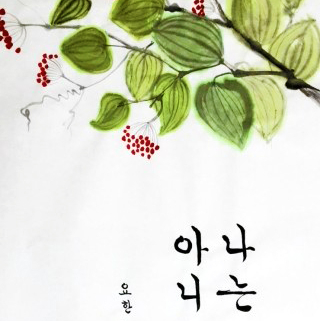
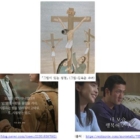
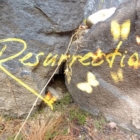
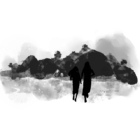
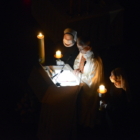



댓글을 남겨주세요
Want to join the discussion?Feel free to contribute!